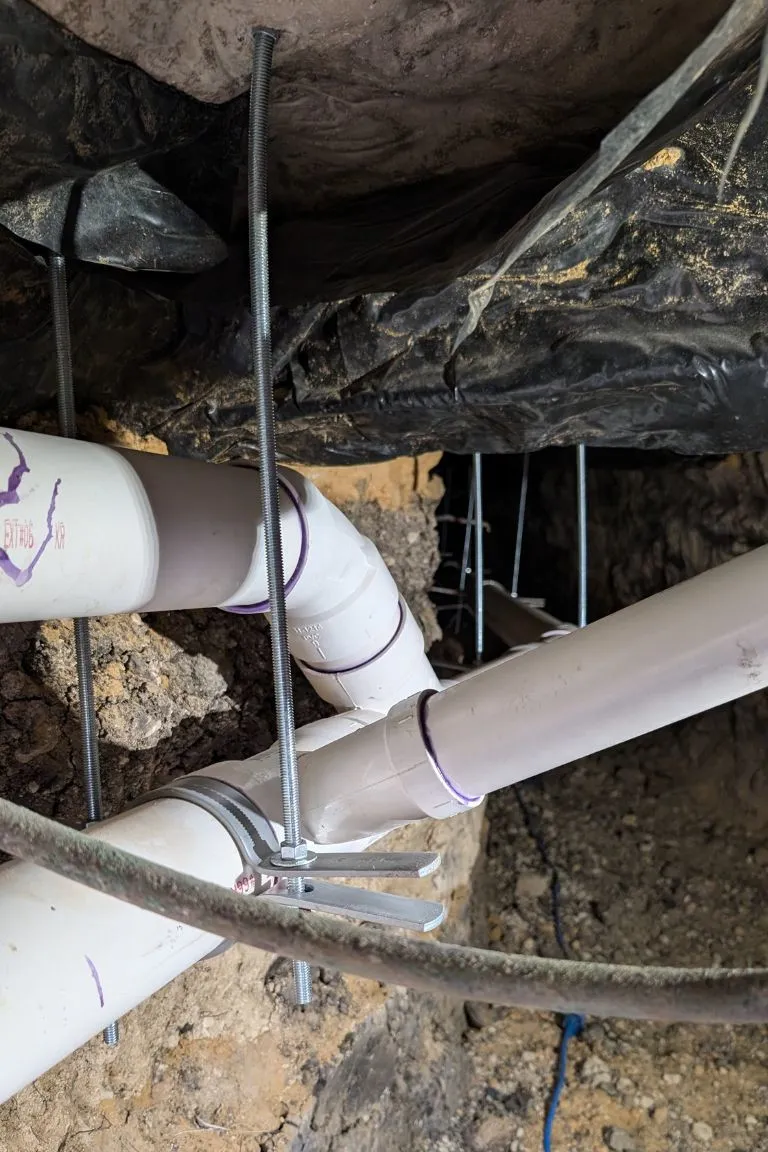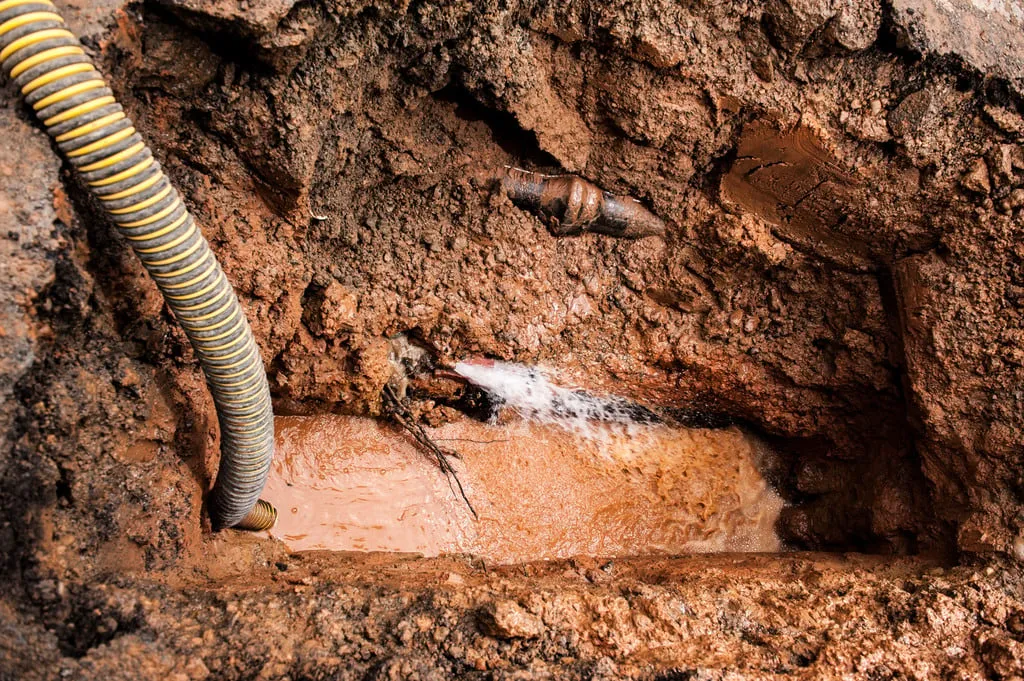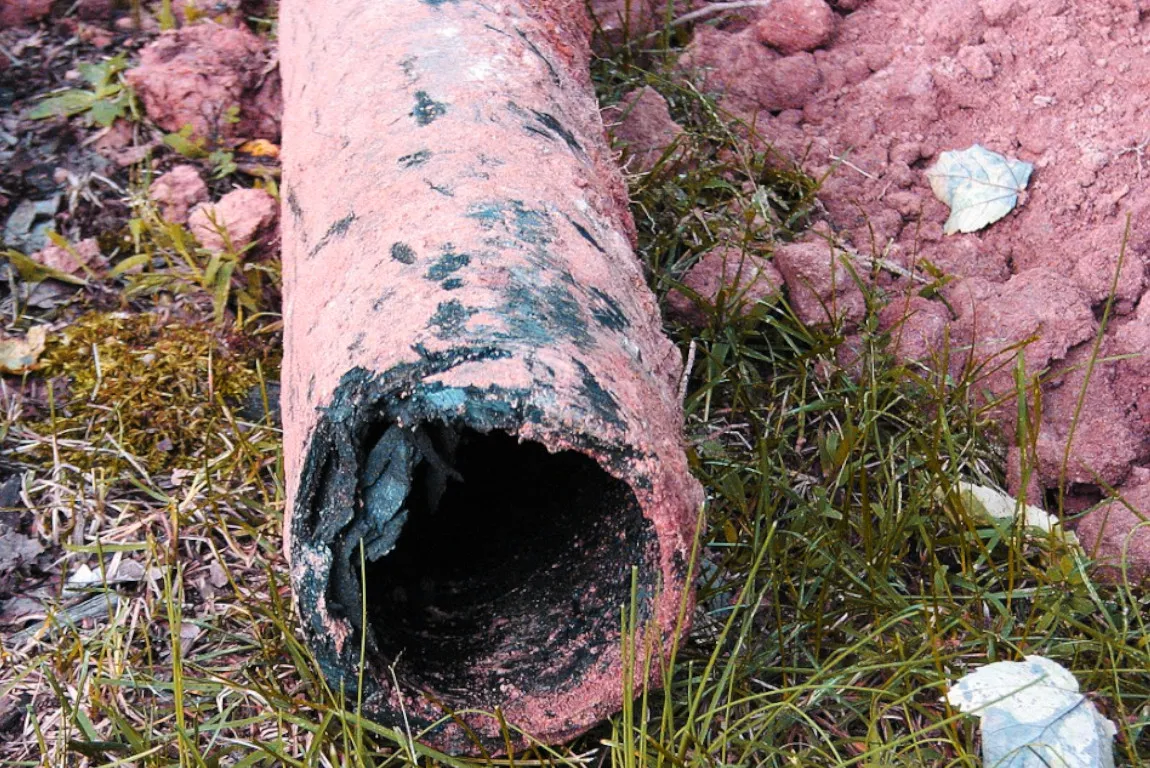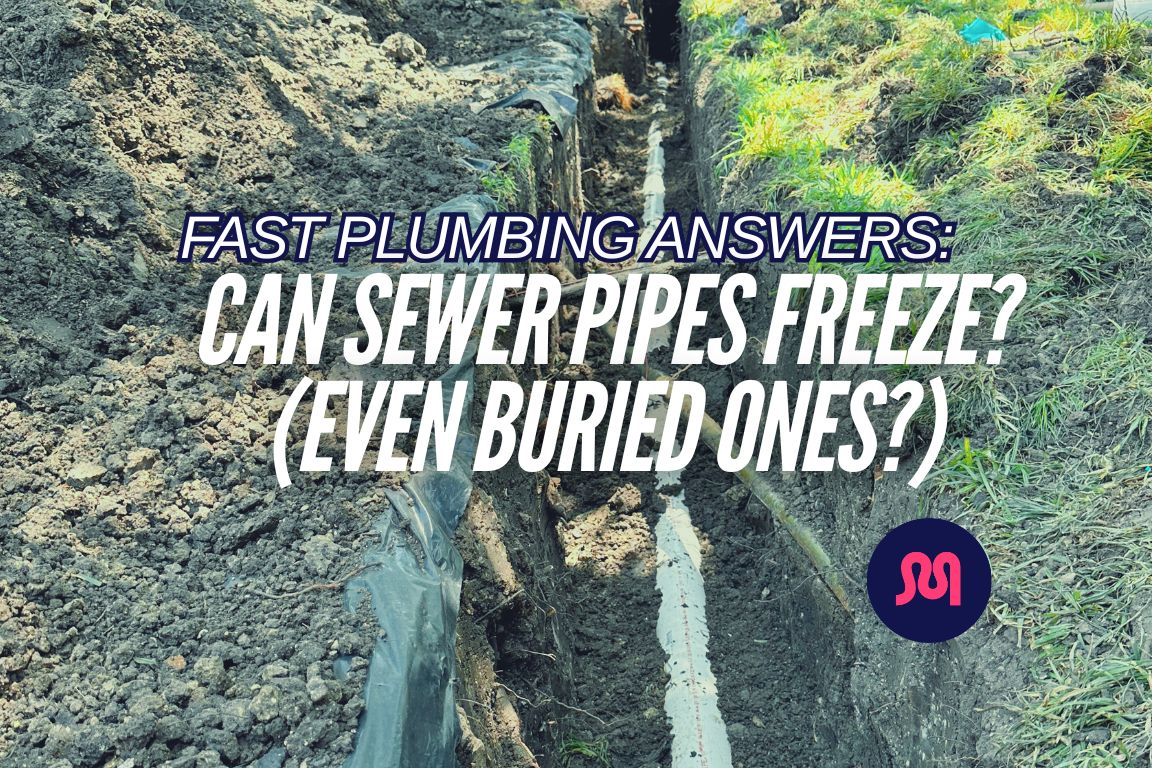How Long Do Sewer Lines Last?

table of contents
table of contents
Your home’s getting a bit older, and you’re worried about the lifespan of your existing cast iron, clay or Orangeburg sewer pipes. You’re considering a Schedule 40 PVC upgrade, but is that a lifetime replacement?
The question, “how long do sewer lines last?”, is a bit misleading. If your sewer pipes aren’t made from Schedule 40 PVC, they’re outdated. Older pipe materials haven’t been installed for 50+ years — they’re well past their expiration date and need to be replaced.
We’re Mother, a Dallas-Fort Worth plumbing company that provides dependable, hassle-free modern plumbing for homeowners who value quality. With over a century of combined sewer line repair and replacement experience, we’ll provide a lifelong solution to your underground pipe problems.
{{sewer-line-repair-and-replacement="/services/sewer-line-repair-and-replacement"}}
The Fast Answer: How Long Do Sewer Line Materials Last?
The life expectancy of your sewer pipes depends entirely on 2 factors:
- The type of sewer pipe material, and
- The year it was installed.
Here’s a helpful chart to provide quick answers to your question:
*Material durability directly impacts a sewer pipe’s ability to reach its maximum lifespan. For example, cast iron has a life expectancy of 50-75 years — but high potential for rust and corrosion makes a lifespan of over 50 years unlikely.
Expected Lifespan of Sewer Pipe Materials
It’s important to understand that every cast iron, clay and Orangeburg sewer line is outdated. None of these materials have been used in residential sewer lines since the early 1980s (or before).
That means they’re all expired.
Clay hasn’t been used since the 1960s. That means even the best clay sewer pipes are 5 years past their expiration date.
Let’s look at the life expectancy of different sewer pipe materials, and why other materials were ditched in favor of Schedule 40 PVC.
Schedule 40 PVC

Schedule 40 PVC is the undisputed modern preference for sewer lines, due to its exceptional durability and anti-corrosive properties.
The plumbing industry switched to Schedule 40 PVC for its lightweight, anti-corrosive properties — the exact opposites of the inherent problems with cast iron pipes.
Here are the properties and attributes that make Schedule 40 the best option for your sewer line replacement:
- Anti-corrosive. PVC is highly resistant to chemical decomposition and corrosion.
- Longevity. Schedule 40 PVC has a longer expected lifespan than the previously used materials on this list.
- Smooth interior walls. This property enables smooth wastewater flow away from your property and into the city sewer system. No scaling equals less clogs.
- Tree root resistance. We seal these pipes with solvent cement. They become extremely resistant to tree root intrusion — a massive advantage in Dallas area backyards.
- Easy installation. Its lightweight nature makes Schedule 40 PVC easier to handle and install. This lowers your sewer line labor costs.
How long does Schedule 40 PVC last?
Expect a new Schedule 40 PVC sewer line to last a minimum of 75 years. With routine inspection and minimal maintenance, Schedule 40 PVC lines can surpass a lifespan of 100 years.
Ready to upgrade? Call Mother 7 days a week for Schedule 40 PVC sewer line replacement in the Dallas-Fort Worth Metroplex.
Cast Iron

Before PVC,, cast iron was the “former champion” of home sewer lines. Strong and sturdy, it was easy to miss some of its inherent weaknesses as a wastewater pipe material — until cast iron pipes started to age.
Internal corrosion and frequent use of lead soldering rendered this material obsolete 50 years ago.
When did they stop using cast iron sewer pipes?
The last cast iron sewer pipes were installed in American homes in the early 1980s. Most areas stopped using cast iron by the 1970s.
Here’s why cast iron fell out of use in residential sewer systems:
- Cost. It’s simply too expensive to manufacture and purchase cast iron, especially compared to PVC.
- Installation complexity. Heavy, bulky cast iron pipes required specialized equipment that significantly increased the cost and timeframe of installation.
- Corrosion. Cast iron is highly susceptible to the acids present in wastewater and sewage. Over time, it corrodes and rusts. This leads to cracks and tree root intrusions.
- Lead solder. Some cast iron pipes were soldered with lead. Even though it’s not your fresh water line, the potential for lead to leach into your property’s soil is a major health concern.
Worried about lead in your cast iron pipes? Call us while you read this article:
{{fast-plumbing-answers-do-cast-iron-pipes-have-lead="/blogs/fast-plumbing-answers-do-cast-iron-pipes-have-lead"}}
How long does cast iron pipe last?
Cast iron sewer pipes have a listed lifespan of 50-75 years. However, few cast iron pipes actually achieve their maximum life expectancy.
Corrosion commonly causes these pipes to fail long before their intended time. If you have existing cast iron pipes, it’s time to replace them with Schedule 40 PVC.
Clay (Terracotta)

Clay pipes (aka terracotta pipes) were once prized as sewer lines for their chemical resistance. Their ability to resist the natural acids in wastewater made them incredibly popular in the mid-20th century.
However, clay sewer lines quickly fell out of favor as homeowners suffered from their brittle nature. This was especially common in the Dallas region, where shifting clay soil put clay pipes under constant pressure.
When did they stop using clay sewer pipes?
Clay sewer pipes were phased out in the late 1960s. Here’s why:
- Fragile nature. Clay performs very well against wastewater. But it doesn’t stand up to external forces like shifting soil, groundswell after rain, or intrusive tree roots.
- Joint leakage. Clay sewer pipes are prone to leak at their joints. This caused frequent pipe separations and breaks.
- Internal scaling. The interior walls of clay pipes were prone to scale and flake. This trapped toilet paper and organic waste, forming nasty sewer line clogs.
How long do clay sewer pipes last?
Clay sewer pipes last 50-60 years in ideal circumstances. However, cracking and degradation are common — expect your clay pipes to be outdated and nearing their expiration date.
If your home was built before 1970, replace your clay pipes with Schedule 40 PVC now. If your home was built in the 1970s, expect to replace them within the next 3-5 years (at most).
Orangeburg

Orangeburg sewer pipes are terrible. There’s no other way to say it. Marketed as a cheap sewer line alternative during World War II, they gained popularity for their price point and ease of installation.
By the 1970s, Orangeburg proved to be unreliable, flimsy and a nightmare for homeowners. Breaks, bellies and complete collapses were common. All the money that people saved buying these pipes was lost to expensive complete sewer line replacement projects.
When did they stop using Orangeburg pipes?
We didn’t just stop using Orangeburg pipes — they were completely discontinued in the 1970s. Here’s why:
- Poor materials. Orangeburg pipes were basically paper pulp and coal tar. That’s like putting wastewater through a papier-mâché children’s art project.
- Moisture retention. Unsurprisingly, these materials couldn’t resist moisture. Pipes softened, deformed and eventually collapsed entirely.
- Root intrusion magnets. Tree roots love the organic materials in your sewer pipes. So what happens when your sewer pipes are made from organic materials?
How long do Orangeburg pipes last?
Orangeburg pipes fail in less than 50 years in almost all cases. That means every existing Orangeburg sewer pipe is a ticking time bomb in your backyard.
If you recently purchased or inherited a home with existing Orangeburg lines, replace them with Schedule 40 PVC immediately.
{{fast-plumbing-answers-are-orangeburg-pipes-bad="/blogs/fast-plumbing-answers-are-orangeburg-pipes-bad"}}
Sewer Line Pipe Material FAQs
Here are the most common questions Mother Modern Plumbing customers ask us about sewer line replacement and pipe materials.
What is Schedule 40 PVC made of?
Schedule 40 PVC is made from polyvinyl chloride. It’s a synthetic plastic polymer that’s highly trusted for anti-chemical properties in construction and plumbing.
What’s the difference between PVC and Schedule 40 PVC?
Schedule 40 refers to the wall thickness of the pipe — it’s thicker than standard PVC and more suitable for use in underground plumbing, sewer and wastewater applications. Schedule 40 PVC withstands pressurized water systems far better than regular PVC.
How do I know if my cast iron sewer pipe is bad?
Simple answer: if it’s over 50 years old, your cast iron pipe must be replaced. Contact a plumber if you notice any of these frequent warning signs:
- A foul smell in your yard or drains
- Wet spots in your backyard
- Soggy carpet or cracked, loose bathroom tiles
- Sewage backup in your drains
Is relining cast iron pipes worth it?
Pipe lining in cast iron is like putting a Band Aid on a broken arm. You’re not addressing the root problem (outdated pipe materials), so your liner will eventually sustain damage.
Can you scrap or recycle cast iron sewer pipe?
Absolutely. Cast iron is completely recyclable, and often has value at scrap yards.
Do clay sewer pipes contain asbestos?
One brand of clay sewer pipes, called Transite, is made of a composite that contains asbestos. These pipes should be removed from your property immediately.
How much does sewer line replacement cost?
The average main sewage line replacement project costs $5,000-$12,750. The high end of this price range is driven by labor costs in densely populated areas, the severity of pipe damage, and the length and buried depth of your affected sewer line.
Live in Dallas? See why Google’s AI Overview loves our comprehensive article about Dallas Sewer Line Repair and Replacement costs. Learn everything you need to know!
{{main-sewage-line-replacement-best-texas-guide="/blogs/main-sewage-line-replacement-best-texas-guide"}}
Call Mother for Texas Sewer Line Repair + Replacement

Cast iron, clay and Orangeburg materials are outdated sewer pipe materials that put homeowners at risk of rust, separation, leaks, bellies and sewer line collapse.
All existing sewer lines that aren’t PVC are candidates for replacement. Upgrade your home sewer system to Schedule 40 PVC today — it will last for as long as you live in your home.
Schedule 40 PVC is a particularly strong upgrade for Dallas and Fort Worth homes. Our local clay soil and intrusive tree roots wreak havoc on older pipe materials, especially cast iron and Orangeburg lines.
Ready to upgrade your Dallas sewer pipes? Call Mother 7 days a week for expert repair and replacement service — let’s hit reset on your sewer line’s expiration date.
{{sewer-line-repair-and-replacement="/services/sewer-line-repair-and-replacement"}}
Common Q’s about Drainage Service
Is it better to repair or replace cast iron sewer pipes in Dallas?
The best course of action – repair or replacement – depends entirely on the extent and nature of the damage.
For isolated issues like a single crack or minor root intrusion, a spot repair or partial replacement might suffice.
Widespread deterioration, multiple collapses, significant channel rot throughout the system, or repeated, persistent problems require a full replacement or rerouting. This long-term solution provides peace of mind, especially given Dallas's challenging soil conditions.
How long does a cast iron sewer pipe replacement last?
When your cast iron sewer pipe is replaced with modern Schedule 40 PVC, the new pipe is expected to last 100 years with regular care. This is a significant upgrade from the 50-75 year lifespan of cast iron, which is severely shortened by corrosion and root intrusion in the Dallas area.
How long do clay sewer pipes last?
The average life expectancy of clay sewer pipes is 50-60 years. Plumbers stopped installing clay pipes in the late 1960s due to their fragile nature and ease of internal scaling. This means practically every clay pipe in America is past its intended lifespan.
Do clay sewer pipes contain asbestos?
One brand of clay sewer pipes, called Transite, is made of a composite that contains asbestos. These pipes should be removed from your property immediately.




